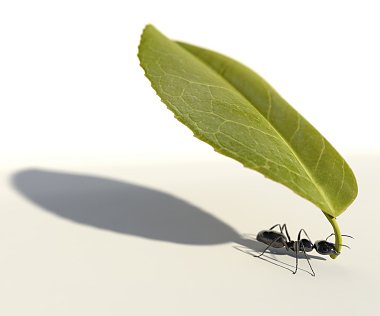Tips for Repelling Ants

Ants provide a vital function in the ecosystem-it is only when their populations get out of hand that they become problems. Ants are scavengers and soil aerators. They also provide food for birds, lizards, toads and other small animals. Their movement through the soil helps water and air penetrate the soil.
How to Repel Ants
Sometimes, though, the industriousness of ants gets a little out of hand. At that point, you need to repel the ants from your home or garden. Ant repellents and ant control mechanisms work in a variety of ways. Ant baits are designed for the ants to take back to the colony to wreck havoc with the colony. Ant repellents work by discouraging ants from entering areas, or by covering their pheromone tracks. Other ant controls kill ants on contact. Here are some natural remedies to help rid your domain of ants.
Diatomaceous Earth
This remedy is best used indoors, as a rain will cause the earth to wash away or cement together-either way rendering it ineffective. Diatomaceous earth is the fossilized bodies of long dead sea creatures ground up into a small dust. These creatures had silica in their bodies, which makes diatomaceous earth basically a compound of ground-up glass. Hence, it can be a very effective barrier to ant movement, but it also has adverse effects if inhaled directly into the lungs. It can’t be used around small children and pets—at least not where it can be reached.
Exploding Cornmeal
Cornmeal itself does not explode. However, if you sprinkle cornmeal onto an active ant mound, the ants will take it inside and eat it. Then, the cornmeal will expand inside of the ants, causing them to explode. Grits will have a similar effect.
Vinegar and Cinnamon
You can repel ants, or at least keep them from coming into your house by spraying their trails with vinegar or cinnamon. The scent of each will confuse the ants and literally “throw them off the scent” Ants navigate partially by pheromones, and the vinegar and cinnamon disguise the smells. These repellents will wash away in a rain, though.
Repellent Plants
Ants do not like the taste or smell of mint plants-peppermint and spearmint. Tansy is also not a favorite of ants. You can plant a “repellent” garden or perimeter of these plants, though all three can become invasive.
Orange Peel Tea
There is some research showing that ants do not like a chemical substance in orange peels. D-limonene is extracted from citrus peels to create a variety of insect repelling compounds. The concentrations in commercially produced repellents are around 6%. It is kind of hard to reach that when brewing your own ant repellent at home. A combination of citrus peel tea with a drop of soap works effectively to both kill and repel plants—though likely because of the combination of the soap and the citrus, rather than a high concentration of citrus.
I Must Garden Ant Control
A safe and effective way to repel ants is with I Must Garden Ant Control. Drench colonies or nests for fast action. Spray around home foundations and entry points to keep ants away. Indoors, it”s always best to test spray area for staining. Spray areas that ants have discovered to repel the ants from further exploration. Spray directly on ants for fast results. Monitor areas after application and reapply as needed.
We want you to be satisfied with every purchase from I Must Garden, if you have any questions or concerns please contact us




Login and Registration Form